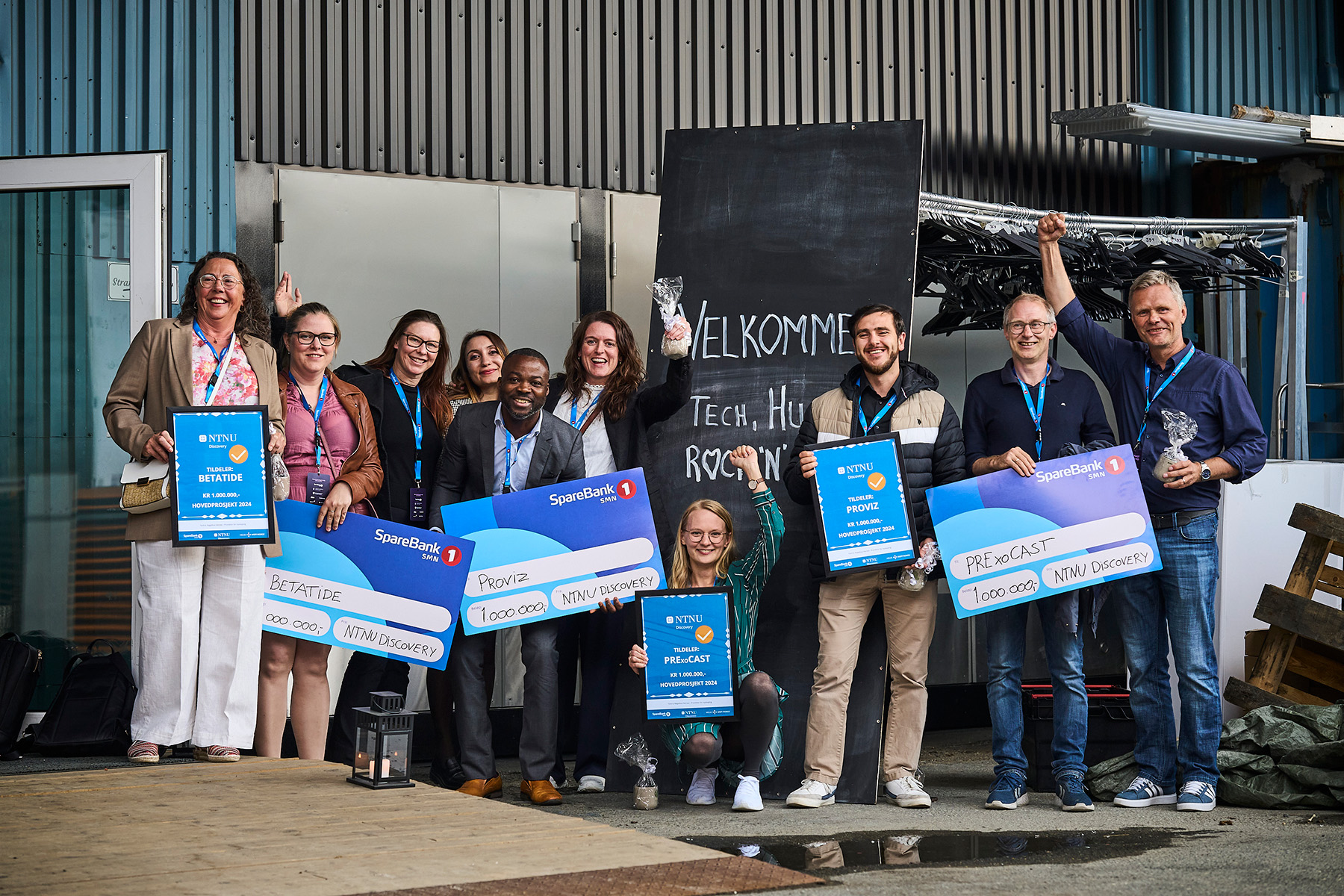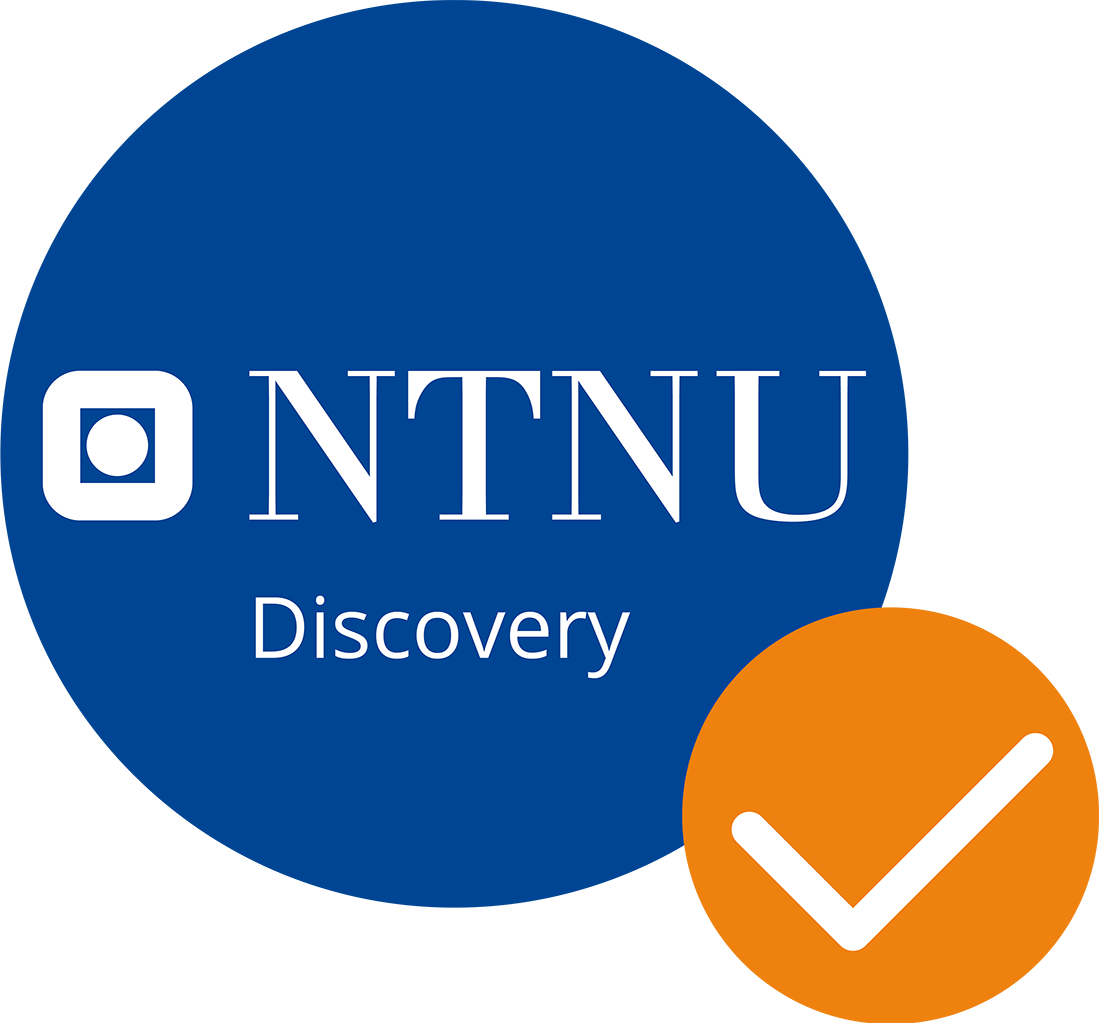
4.6 million for “heros of tomorrow”
“I think we should give everyone a big round of applause. These are the heroes of tomorrow,” proclaimed Pro Vice-Chancellor Torill Hernes in front of hundreds of people at the biannual event Tech, Hugs & Rock ‘n’ Roll at Havet on June 6. June, where Trondheim’s entire start-up community and Minister of Digitisation Karianne Tung were gathered.
Text: Per-Steinar Moen
Photo: Kristoffer Wittrup
She has just awarded NOK 300,000 to 1,000,000, and a few cups of coffee, to selected employees and students at NTNU and the Central Norway Regional Health Authority who have the best business ideas linked to research results.
In this year’s first award, a total of two projects from students and four from employees at NTNU and Central Norway Regional Health Authority were awarded funding for the main project.
New weapon against antibiotic resistance
NTNU Professor Målfrid Østfold received NOK 1 million for Breastida. She leads a team at the Institute for Clinical and Molecular Medicine that develops a new medicine that can be used for highly aggressive breast cancer with the aim of reducing the need for chemotherapy, facilitating individualized treatment, and reducing side effects. In 2020, Breastida was awarded NOK 10 million from the National Competence Center for breast cancer research, a grant that will be continued in 2021 to develop Breastida.
Betatide is a variant of a peptide drug, ATX-101, under development as a cancer medication. The discovery of the peptide drug’s antibacterial effect happened by chance, a known pattern in antibiotic research. On a hot summer day in 2011, the window was open in Marit Otterlei’s team’s lab while they were testing various drugs on cancer cells in connection with the development of ATX-101 – a promising cancer medication. After a few days, an infection occurred in the cancer cells, except for the cancer cells treated with ATX-101.

Betatide is an abbreviation for “beta clamp targeting peptide,” and the drug attacks the bacteria by binding to the protein[MO1], which is crucial both in the bacteria’s ability to replicate its DNA and in mutagenesis – the process that causes bacteria to mutate and thereby become resistant. This mechanism of action for an antibacterial drug is entirely new and shows promising results with no cross-resistance to known antibiotic resistances.
“It is a long process to develop a drug,” says Marit Otterlei. The development of the cancer drug ATX-101 has so far cost around NOK 200 million. Initially, a newly developed drug must undergo various animal tests to assess its effectiveness in infection models outside a controlled lab environment and then for toxicity – that is, how high a dose can be used before the side effects become too severe. The animal tests to check if Betatide works on the infection models will cost around NOK 2 million[MO2], and the money will be used for this. “ “Getting the extra million has been very useful. We can now conduct more small pilot studies before starting the large studies,” she says. “This will improve the quality of our work, which can make a significant difference in the study results.”
Prostate cancer
Overall, the medical community at NTNU and Health Mid-Norway was well represented in the distribution, which shows how advanced parts of this environment are in innovation and research.
Two of the six projects that received support are developing products aimed at diagnosing prostate cancer. To get a diagnosis, patients often have to undergo an uncomfortable procedure to take a tissue sample from the prostate with a risk of serious infections afterward.
The PROVIZ group, led by Professor Tone Frost Bathen, uses artificial intelligence and machine learning to create probability maps of cancer tumors in the prostate. This allows the urologist to take relevant tissue samples from specific areas in the prostate gland. The method will potentially lead to fewer procedures and more accurate tissue samples. PROVIZ received NOK 1 million.

PRExoCAST, on the other hand, led by Morten Rye at the Institute for Clinical and Molecular Medicine, has a different approach to avoid invasive biopsies. They are developing a gene test used on liquid biopsies, i.e., urine or semen samples, which can differentiate aggressive prostate cancer from more harmless, slower forms. This group also received NOK 1 million.

Safer navigation
mHUD 2.0 is a simple, affordable, and intuitive product designed to assist operators on ships under challenging conditions, for example, when it is dark or visibility is poor. The solution is an LED strip mounted above the windows on the bridge that uses simple light and color signals to indicate the direction of other traffic, lighthouses, shallow water, or other obstacles. The goal is for the product to increase awareness of the surroundings, make operators less dependent on looking down at instrument panels, and thereby avoid accidents or potentially dangerous situations. The system should be easy to install and adapt to both new and old ships or remote control centers.

mHUD 2.0 is based on an idea by Felix Petermann at SFI Autoship and is being developed by a team at the Department of Computer Science and the Department of Design.
The group received NOK 1 million to further develop this idea.
NOK 300,000 for two student projects
This year, NOK 300,000 was also awarded to two student projects. Kynetix is led by Benjamin James Granrud from the Department of Design, and the product aims to develop affordable exoskeleton legs for patients with muscle diseases, specifically targeting the elderly. An exoskeleton is an external skeletal structure that can provide better and safer movement, replacing aids such as wheelchairs, walkers, and crutches, while allowing the patient to use more independent, natural movements. Kynetix is developing a hybrid system that controls walking movements and makes the system adaptable to various needs. The system both prevents falls and provides protection against falls.

In addition, GreenLedger, led by student Henrik Sommerseth at the Department of Industrial Economics and Technology Management at NTNU, received funding to develop software to calculate the cost of environmental footprints. The software uses available business data to convert greenhouse gas emissions, waste, water consumption into monetary values.
The next application deadline for the main project is September 30, 2024.
Other news
Muting rooms with mushrooms
The founders of Demp believe that the mushroom's root network can be used in everything from soundproofing panels to replacing asphalt.
Viruses Built to Target
Rajeevkumar Raveendran Nair at the Kavli Institute of Neuroscience has received NOK 1 million to further develop transport viruses that can transport gene-therapy drugs, but only activate them in specific cells. EDGE-Tx is the virus that may become an important tool in the fight against Alzheimer’s disease.
Contact:
Project Manager
Jan Hassel
Email: jan.hassel@ntnu.no
Telephone: +47 906 53 180
Office: Main building
Håvard Wiebe
Email: havard.wibe@ntnu.no
Telephone: +49 414 73 768
Office: Main building



